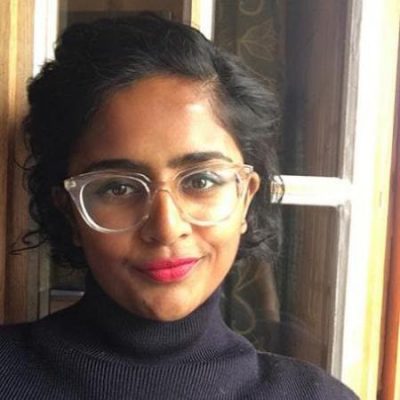Postdoc Spotlight: Mathura Umachandran

September 28, 2021
Mathura Umachandran is a postdoc in classics from London, England. She holds a doctorate from Princeton University and her research at Cornell focuses on classical reception. She is a recipient of a Postdoc Achievement Award as part of Cornell’s celebration of National Postdoc Appreciation Week 2021 for her contributions to research, teaching, and conversations on diversity, equity, and inclusion in classics.
What is your research area of emphasis?
I am trained as a classical philologist – i.e. studying Greek and Latin texts – in a very traditional mode. I have devoted my research, however, to thinking about how the idea of ‘the classical’ is formed, the ideological service into which Greece and Rome are pressed, and how the cultural value of classics is made. My research is in the subfield known as classical reception – I am fascinated by the grounds of engagement between classics and ‘theory’ of many stripes – critical theory and the Frankfurt School, critical race studies, queer theory are the areas that I focus on.
What are the broader implications of this research?
I engage with the classical as a kind of meaning-making, world-building exercise. I want to understand how the idea of Greece and Rome inflects, authorizes, and orients systems of power. Knowing about classics has for so long been a way to justify the very worst tendencies of modernity towards domination (in the development of race science, in the building of empires) – my work in bringing various oppositional theoretical frameworks to this knowing is to unpick this domination. In collaboration with others, I want to build instead justice-oriented modes of knowledge-making.
What does receiving a Postdoc Achievement Award mean to you?
I am delighted to have received the award, and to have been nominated by my department! Undertaking research that is explicitly critical of existing disciplinary structures can be tough, not to mention lonely. In Cornell classics, I have found a community of scholars who are supportive of my research aims and public scholarship. It is also recognition of ‘Critical Conversations’, the department-wide discussion group I co-run with Nicole Gianella, which requires work and planning to set up a vibrant space for teasing apart and learning together the tools we need for making a more just discipline.
What hobbies or activities do you enjoy in your spare time?
I enjoy winding down by cooking and I love having people over to share food with. I love the magic of cooking as a kind of transformation and a way to care for self and others. My comfort food is Tamil, the food I grew up with at home. I have also been known to run, climb, and do yoga, though I am inconsistent with the practices that require consistency. Since moving to Ithaca in August, I spend a lot of time on the phone with friends scattered all over the world and have kayaked.
Why did you choose Cornell?
It was a perfect fit of a job advertisement – in classical reception and critical race studies – and I had heard only good things about the department prior to coming here. As a graduate student, I had spent summer 2014 in Ithaca at the School of Criticism and Theory – it was a summer of passionate intellectual engagement and an intense vividness of living. It seemed like I was destined to come back here somehow!
What is next for you?
I hope to get a decent chunk of my book written this year! I’m looking forward to teaching Classical Myth with Cornell Prison Education Program.
Do you have any advice for current graduate students?
Take rest as and when you can. Take pleasure in ideas and thinking in all sorts of different collectives and constellations. Take risks with other kinds of writing than finesse-ing academic prose, don’t let it crowd out the other writing lives you might have alongside your work. Take risks with frameworks that are not yet established or recognized. And yet on the matters of risk: the future is so unknown for so many of us as junior scholars, as people – all we have is solidarity. You are not only a sad mind wandering the halls – there is life beyond! Go to therapy.
